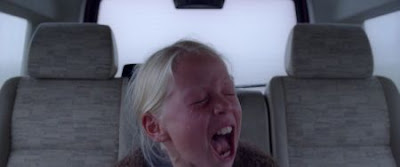Mads Mikkelsen is one of
TrustMovies' favorite living actors. We'll watch him in just about
anything, and now, after his two current endeavors, we feel that we have.
ARCTIC, the better -- if still pretty tiresome to sit through (unless you're a glutton for punishment) -- of the two films finds the actor stranded in that titular locale after a plane crash. Except for its frozen wasteland, the film has oodles in common with the earlier survival-at-sea movie,
All Is Lost, which was infinitely easier to sit through because there was so much more going on and we learned more about the film's single character than we ever do here.
As directed and co-written (with
Ryan Morrison, who also edited the movie) by
Joe Penna (shown at right), what's mostly going on in
Arctic is a lot of trekking and trudging across frozen vast white spaces, as our hero hopes to be rescued or reach some kind of civilization.
That's it, plot-wise. To even begin to describe the very few "incidents" that try to enliven that plot would be to give away the minor spoilers the film offers. Best to concentrate on Mr. Mikkelsen, below, who proves, as usual, quite watchable.
The character he plays, Overgård (we know this only from the name on the jacket the man wears), is clearly highly intelligent and resourceful --
de rigueur for this kind of film -- which of course will help him in his quest/journey. Yet the most interesting thing we note about Overgård is his his concern and caring for
life -- in whatever form it takes. This is clear early on, as he catches a fish, and later come to further fruition via his treatment of one of the only two other humans we (vaguely) meet in this movie.
If you are a fan of lone survivor movies -- and
not those of the horror/thriller/slasher sort --
Arctic may be quite to your taste. I found it slow going, with a finale (spoiler just ahead) that, while welcome on one level, utterly disappoints on another, via its obvious nod to the necessities of feel-good, commercial cinema. Overall, while I admired things about the film, I didn't actually enjoy it much.
From
Bleecker Street and running 98 minutes,
Arctic opened February 1 on the coasts and will hit South Florida tomorrow, Friday, February 22. In Miami, it will play the
AMC's Sunset Place 24 and
Aventura 24 and
Regal's South Beach 18, in Fort Lauderdale at
The Classic Gateway, in Boca Raton at the
Regal Shadowood, in Boynton Beach at the
Cinemark, in West Palm Beach at the
AMC City Place 20 and
Cobb's Downtown at the Mall 16 in Palm Beach Gardens, and in Jupiter at the
Cineopolis. Wherever you may live around the USA, click
here to find your nearest theater(s).
We get to see lots more of Mr. Mikkelsen in
POLAR, the junky, envelope-pushing, let's-out-Tarantino-little-Quentin movie directed by
Jonas Åkerlund (shown below), with a screenplay by
Jayson Rothwell, from the graphic novel by
Victor Santos.
In the film, Mikkelsen plays Duncan Visla, the world's best assassin-for-hire (a profession that is not exactly "heroic," right?) who, when retirement time comes, is betrayed by his "boss" so that said boss can have what ought to have been Visla's multi-million-dollar retirement bonus.
The boss (played by an over-the-top
Matt Lucas, below), by the way, is doing this to
all his retirement-age assassins. Perhaps an assassins' union is in order? In any case, this nasty guy has sent out his supposedly best set of young assassins to murder the old ones. But in trying to reach their prey, these "kids" decide to murder a whole bevy of those whom they find "in between."
While watching this increasingly florid crock of shit you can't help wondering: Did the filmmakers somehow imagine that because they've dressed their kids in cutesy costumes and chosen perhaps the weirdest set of victims so far seen -- the most horrible is the character who seems to have stumbled from
My 600-Pound Life into his or her (not sure which) 600-Pound Death.
This is envelope-pushing, all right, and it stinks of near complete inhumanity and sleaze. Ooooooh: Let's laugh while we watch these folk being "creatively" murdered. It's not dark, it's dreck. Ah, but there
is that attempt at humanity provided by our Duncan's near-constant flashing back to a murder episode that he clearly regrets. Oh, so sad.
In the supporting cast is
Vanessa Hudgens as the sweet but clearly unhappy neighbor who lives across from Duncan's hide-out home. Hudgens, above, right, with Mikkelsen, is very good (compare this performance with that of her Maureen in the recent
Rent: Live on TV), and so, I suppose, are many others in the large cast. But to what avail?
Mikkelsen himself (above, further above, and torso-wise below) seen mostly in black eye-patch, is reliable as always, and in this film, unlike
Arctic, we get to see much more of him -- killing, cracking-wise, fucking in the nude, and so forth. At age 53 he still looks fabulous and seems to grow more versatile, acting-wise, with each new year. He even executive produced this film (he must have been impressed by the success of his envelope-pushing
Hannibal TV series). But again, to what avail?
Streaming now via
Netflix,
Polar runs just under two full hours. The film's finale actually proved a nice surprise (to me, at least; you might have guessed the connection) that even made good sense. But, boy, how I wished there had been a decent movie in front of that interesting ending.











































